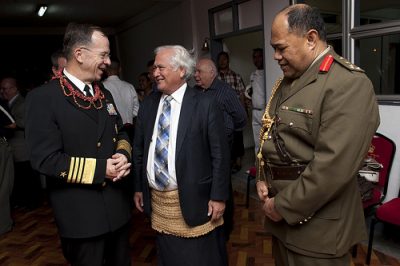 Tonga’s first-ever democratic elections took place smoothly on Thursday, and resulted in a resounding victory for those urging reform. ‘Akilisi Pohiva’s Friendly Islands Democracy Party won 12 of the 17 popularly elected seats, just two short of the number required to form a government. The other five popularly elected MPs are independents, who at least in theory could team up with Tonga’s nine noble MPs to form a government. The nobles, however, have made clear that they – and indeed King George Tupou V – prefer that Tonga’s next prime minister should come from among the people’s representatives. For the first time in Tonga’s history, therefore, the outcome of a general election will determine the shape of the country’s next government.
Tonga’s first-ever democratic elections took place smoothly on Thursday, and resulted in a resounding victory for those urging reform. ‘Akilisi Pohiva’s Friendly Islands Democracy Party won 12 of the 17 popularly elected seats, just two short of the number required to form a government. The other five popularly elected MPs are independents, who at least in theory could team up with Tonga’s nine noble MPs to form a government. The nobles, however, have made clear that they – and indeed King George Tupou V – prefer that Tonga’s next prime minister should come from among the people’s representatives. For the first time in Tonga’s history, therefore, the outcome of a general election will determine the shape of the country’s next government.
Since King George Tupou I unified the scattered island group in the mid-19th century, Tonga has had royal-appointed governments. The 1875 constitution created a Legislative Assembly, but the king retained authority to appoint members of cabinet, including the prime minister.Periodic elections were held, every three years, from 1915, but Tonga’s citizens could vote for only about a third of the MPs (nine since 1981). The holders of 33 officially recognised noble titles selected another nine MPs. Ministers, who were not elected, also sat in the Legislative Assembly, but they were reliant on the king’s favours and not the confidence of parliament.
Pressure for change has been growing since the 1990s, and it has increased since riots led to the destruction of the business district in the capital, Nukualofa, in November 2006. In 2005, the king for the first time allowed two each of the people’s and nobles’ representatives into cabinet. One of those, Feleti Sevele, subsequently became prime minister. With the accession to the throne of King George Tupou V in mid-2008, the pace of change has accelerated. Although he remains a powerful figure and retains important powers (for example, over the judiciary), he has rejected proposals that he retain ability to select some MPs.
Whoever becomes Tonga’s next prime minister will be in a powerful position – with powers to nominate four MPs to the 30-member assembly and a grace period that prevents a vote of no confidence for 18 months.
The election outcome was consistent with previous polls: the popular pro-democracy leaders did well, particularly on the main island of Tongatapu. Mr Pohiva obtained 62.5 per cent of the vote in Nukualofa, while Isileli Pulu, with 58.4 per cent, also scored well. Other Democratic Party candidates had much smaller shares of the vote. As usual, the Vavau group, in the north, bucked the national trend, electing more conservative politicians. Overall, the number of candidates contesting, 143, was more than double that at the previous polls in 2008, an indication that competition has become more acute now that parliament controls who forms the government. Turnout of about 90 per cent was also exceptionally high, another indication of rising popular political engagement. There were no signs of irregularities in the conduct or administration of the electoral process. The head of the Australian observer team, retired diplomat Bob Davies, reported that people in Tonga can be absolutely confident in the integrity of this election process.
The next government, however, will face a difficult task. Tonga has stagnated over the past decade, with the World Bank estimating 40 per cent of the population lives below the poverty line. Mr Pohiva’s party has shown itself highly adept at building opposition to monarchic rule. It now needs to transform itself into a party of government. It remains to be seen whether the Friendly Islands Democracy Party, launched in September, can hold itself together during the transition.
Jon Fraenkel is a Senior Fellow, State, Society & Governance in Melanesia Program (SSGM), at the School of International, Political & Strategic Studies at the Australian National University. He was a supervisor at the recent election in the Solomon Islands.
This article was first published here in The Australian on November 29, 2010.


Leave a Comment